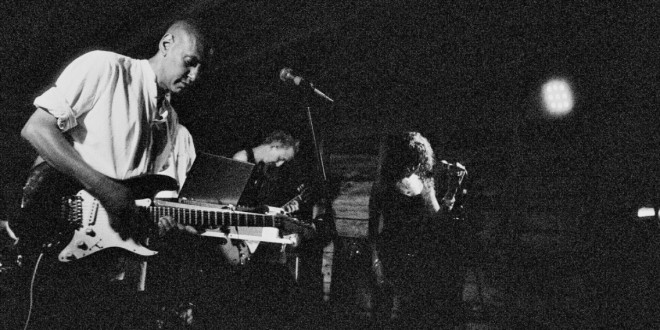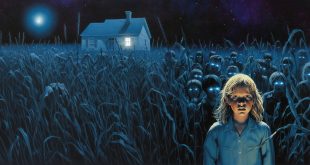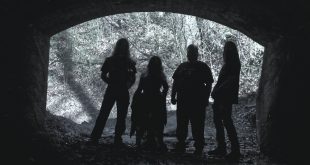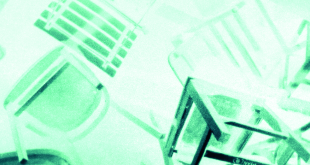Although the band’s name, A.R. Kane, might not ring a bell at first, a majority of Generation X listeners are largely familiar with their collaborative project, MARRS, which produced a worldwide smash hit in 1987’s “Pump up the Volume”. But the band has proven much more beyond having a penchant for pop songs. In fact, A.R. Kane has been consistently cited as one of the most innovative and important bands of independent music in Britain.
Initially formed by vocalist Alex Ayuli and guitarist Rudy Tambala in December 1985, the two went on to craft a signature blend of soul, dub, dance and reverb into a mesmerizing style they coined “dreampop”. By the time the band debuted the album 69 in 1988, they had topped the indie charts, earning sizable credibility among journalists and music connoisseurs alike. Two additional follow-up efforts in 1989’s i and 1994’s New Clear Child (the latter a response to the then-prominent shoegaze scene in the UK) received varying critical favorability. Ayuli and Tambala would soon part ways that same year.
Over two decades since its dissolution, it seemed A.R. Kane had been put to rest for good; that is, until late last year. Even amidst initial conflict, Tambala successfully created a lineup for the band, and the silence was broken. This reincarnation still features contributors from the band’s classic period, including his sister Maggie on vocals, as well as Colin Cairns (ex-Dead Can Dance) on bass. A ‘#’ symbol was added to the band name to signify the absence of Ayuli; its removal is determined upon whether he decides to return.
I had the chance to interview Tambala, given the band’s upcoming European dates—two slots in Spain’s Primavera Sound for June and, most recently, London’s On Blackheath for September. As I’d soon learned during our interview, the founding A. R. Kane guitarist had clarified that the band wasn’t tied to any nostalgia, or to the shoegaze scene they helped inspire whatsoever. Be that as it may, Tambala wholeheartedly respects and recognizes the band’s impact across other genres, and on younger fans, including myself.
ME: Last year, you decided to reform A.R. Kane under the name #A.R. Kane, featuring a hybrid of previous and newer members. Given that this update was an early glimpse of band activity in over 20 years, was there anything that directly—or indirectly—inspired this reunion?
Rudy: We were asked by the guys from Supernormal Festival. I mentioned that we had no live act. They were very supportive and said they’d help me pull things together. So I met Jimmy and John. They were such big fans, and so cool and charming. We sank a few jars, talked music, and I decided, “This feels so right, let’s do it”. Maggie and Alex were the first people I asked. They both said no, which dented my enthusiasm, but didn’t kill it. Both the previous bass players said yes, and Colin [Cairns] ended up joining. Russel [Smith], the other bassist, convinced Maggie to join, so that was that—it just grew from there. As you know, the ‘#’ symbol marked the absence of Alex. I really never knew if it could work without him. I had to step up and lead on vocals, whereas in the past I could just wig out on the guitars. So I brought in Jimmy and a kid called Andy Taylor, my daughter’s best friend and our neighbor. I also added my son Louis on beats and loops. John offered to help manage the live situation and ended up on drums. Crazy, the seven of us—what a logistical nightmare!
ME: When you performed at the MIDI and Supernormal fests that summer, did audiences respond positively to the revamped lineup?
Rudy: It’s difficult to say really. I don’t really think the majority of them had even heard of us, but those that did—the ones that spoke to me after—they loved it. The seven-piece was a good way to replicate live what we did on record. We had never sounded like that live before—never tried to. Having Maggie and Colin there rooted me to a past connection—a still existing musical something—an attitude. Not nostalgic mind, more of a timeless connection. It’s like when you see an old friend after 20 years and two minutes later, it’s as if no time passed, and you just start messing with each other again, and talking. Outside time. Jimmy is an A.R. Kane purist. He knows the intricacies of the recordings and pushed us all to be authentic. It was hard but good. I think we did the songs justice. I have no desire to take that replication approach again. It was a kind of ritualistic re-enactment, to summon the spirit of Kane, if you like. It worked for me, and now I’ve moved on. The new set is stripped back, just 3 of us, and every song created in a new image.
ME: In these kinds of settings, do you enjoy checking out and learning about other bands, even if they’re something you don’t listen to regularly?
Rudy: Yes! I enjoyed every band I met and heard. Spring King was amazing—so tight and with such energy. We sat in the hotel and got mashed with them. One of them, who looked about 14, was reading a thick tome on Sun Ra! I totally adored Loyle Carner—exactly the kind of hip hop I’ve always loved. The thing is, I’m like a kid when I’m at a live show—all gooey and starry eyed. I love to feel that energy. There is so much more than Radio 1, Glasto and Ibiza.
ME: One immediate difference about #A.R. Kane is your sister Maggie singing instead of Alex. I had only really seen him offer his commentary on the Beautiful Noise documentary from a few years back. Had you always been open to letting Alex rejoin, even though he’s doing his own thing?
Rudy: I have yet to see that documentary. I’m in no hurry. Yes, it’s very different. Alex has a certain type of voice. It is part London, part African phenotype, part West Indian inflection. But more than that; he has—or at least he had—an intelligence, charisma, and a serious attitude that cannot be replaced. I like the guy from The Invisibles. His tone of voice is similar. Thought of approaching him, but maybe that’s a bit rubbish. Maggie is a different thing. Obviously coming from similar [familial] roots, there is a lot of similarity, but the feminine aspect changes everything. Maggie sings, [while] Alex vocalized. This version of A.R Kane is different, but serves the same ends. Alex knows he’s always welcome. It’s not my decision anymore than I could choose my brothers. It just is. I doubt we’ll do Sufi songs, but we are writing new A.R. Kane songs together. If I feel they are right, I’ll release them as A.R. Kane; if not, who knows?
ME: With the new band, are there any songs from A.R. Kane’s repertoire that feel particularly nostalgic to perform?
Rudy: Hey, this is A.R. Kane, not the E-Street band, man (laughs)! There is no nostalgia. It may sound crappy, but to me all the songs sound fresh—like just written. “You Push a Knife” is tomorrows bop. “Love From Outer Space” really doesn’t have a timeline. “W. O. G. S.” is pure bliss, in and of the moment. But I respect bands that come out and do the nostalgia thing. Jesus and Mary Chain are doing a Psycho Candy tour. I’d love to see it, but to be honest I’d rather hear new songs or new renditions. Last year I think maybe we were a bit nostalgic. This year, although we still do the old Kane songs, it is completely different. Just me, Maggie and Andy, a drum machine, a sampler and a Korg micro. Three guitars and hazy vocals. We have re-imagined what we think are good dreampop songs. You have to understand, we never played the songs the same way twice anyway. It kind of seemed pointless then, and does again now.
ME: Going back to A.R. Kane’s formation in the mid 80s, you’d jokingly claimed to be in a band that was sort of a stylistic anomaly: “a bit of Velvet Underground, a bit of Cocteau Twins, a bit of Miles Davis, and a bit of Joni Mitchell”. Out of those elements, which ones would you say truly made the transition into your actual sound?
Rudy: All of ‘em! The punk thrash is Velvet Underground. The dreampop guitars with drum machines are Cocteau Twins. The improv and experimentation of 69 is pure Miles Davis. Songs like “Haunting” and “W. O.G.S.” are folk to us—very Joni Mitchell. There are more, but what’s the point? We are magpies (laughs)!
ME: Later on, British press began using the term “shoegazing”, at first to describe bands who motionlessly ‘gaze at their shoes’ while performing. How did you initially take to the term, being a kind of pioneer to the genre and all?
Rudy: We did a few songs that had a similar sound maybe, but we never ever stayed still long enough to gaze at anything—we were very full of motion. We did do the backs to the audience thing, but that was to get more feedback. We were different from those bands. To me they mostly seemed like a bunch of loud rock bands, without any added dimension. We were different; we had a groove; we were inpatient; we needed to keep changing, to not fit in. I think maybe an iconoclastic spirit ran through the band—a rejection of establishment—the punk two finger salute.
ME: So even as the genre become more prominent around the late 80s to early 90s, you never once got acquainted with the scene, or were simply acknowledged by those bands you had inspired?
Rudy: Nope. I never met any shoegaze bands. We were never invited to the parties, the tours, or the gigs. Somehow we were rejected by that scene. Maybe it sensed that we didn’t fit in. Maybe the scene never really existed. I liked My Bloody Valentine, Slowdive, a couple others—the more sensitive, less ‘blokey’ bands. But you never know. Maybe there are parties tomorrow. We ain’t dead yet.
ME: On Facebook, there now seem to be many groups and pages dedicated to shoegaze that consist of not only listeners who were part of that original era, but a much younger generation who are just getting introduced to it. Where do you think the appeal of the music comes from?
Rudy: A.R. Kane is dreampop, not shoegaze! But I know what you mean. There is bliss in that wall of sound, the frequencies, and everything. I created an algorithm for categorizing music—a mental game played by insomniacs like me. The main characteristics are harmonic, sonic, lyrical, and rhythmic. These are in turn modulated by styles, instrumentation, volume, attitudes, era, and so on. You can fit any band or piece of music into this. This bliss that I’m referring to comes when the band ramps up beyond the ‘norm’. There are certain combinations, in particular the sonic and harmonic, and, with A.R. Kane, the rhythmic too. We had a bunch of modulating attitude. That’s why the lyrics were subdued or subsumed without losing the effect. In fact, the voice simply becomes another sonic dimension, like with dub echoes, chanting, and so on. Oh, that reminds me— Spacemen 3— loved their sound. A lot of so-called trance and psychedelia works in a similar way, but for me these forms lack the low-frequency oscillator of introspection. They are an escape from reality; I prefer an intensification of reality. That’s what attracts these young’uns. When I’ve had enough, I turn off the music or grab a drink.
ME: Are there any newer bands in the genre that you’ve either worked with, or were simply moved by?
Rudy: I like Sigur Ros and Animal Collective. Although not particularly new, they are to me. I have heard others but my memory fails me. The Veldt—old friends of ours—have reformed, and I’m working with them on some new tracks that I think blow away most of the new stuff getting played. Also Ummagma—I love their sound and am remixing a couple tracks for their next release. Their sound is so trippy I had to buy new studio monitors to make sure I wasn’t hallucinating.
ME: Lastly, is there anything you’d like to say to your fans? Where might we go to learn more about #A.R. Kane?
Rudy: Do we got fans? Come see us play if you can, if not then why not, I mean what kind of a fan are you (laughs)? Come chat on Facebook, Twitter. We would love to meet you there! Oh, we are planning new recordings this year. Yet to settle on how we get ‘em out to you, but we will.
A.R. Kane Socials: Facebook|Official Website |Soundcloud|Newsletter|Twitter: @InfoKane
 Music Existence Because of Music, We Exist
Music Existence Because of Music, We Exist




